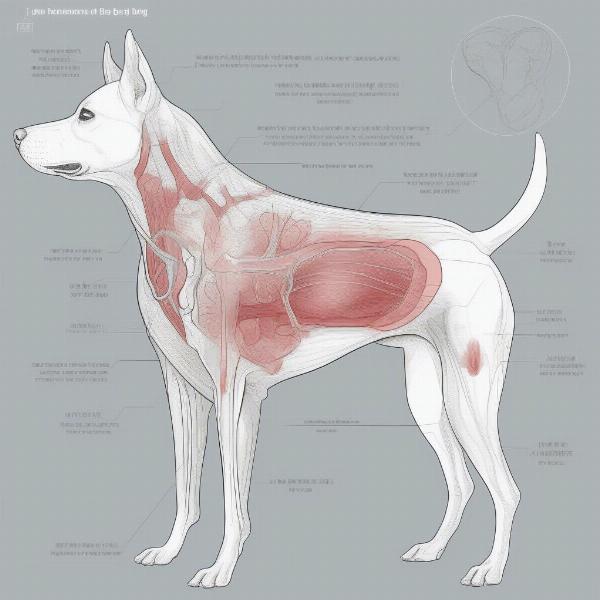Dog breeds with deep chests are often admired for their powerful and athletic builds. But beyond aesthetics, a deep chest plays a significant role in a dog’s health and functionality. Understanding the implications of a deep chest is crucial for responsible ownership, especially concerning breed-specific health concerns and exercise requirements. This article delves into the world of deep-chested dog breeds, exploring their characteristics, potential health risks, and specialized care needs.
Understanding Deep-Chested Dogs
What exactly defines a “deep chest” in a dog? It refers to a chest cavity that is noticeably deeper (from top to bottom) than it is wide (from side to side). This anatomical characteristic often translates to a larger lung capacity, contributing to greater endurance and stamina. Many working and sporting breeds exhibit this trait, reflecting their historical roles in demanding activities.
Popular Dog Breeds with Deep Chests
Several popular breeds are known for their deep chests. Here are a few examples:
- Great Danes: These gentle giants are a classic example of a deep-chested breed.
- Doberman Pinschers: Known for their sleek appearance and intelligence, Dobermans also possess a deep chest.
- Irish Setters: These energetic sporting dogs have a deep chest that supports their active lifestyle.
- Boxers: These playful and loyal companions are another breed with a distinct deep chest.
- German Shepherds: Another popular breed, German Shepherds also fall into this category.
 Health Considerations for Deep-Chested Dogs
Health Considerations for Deep-Chested Dogs
Health Concerns Related to a Deep Chest
While a deep chest can be advantageous for some activities, it also comes with potential health risks, most notably Gastric Dilatation-Volvulus (GDV), commonly known as bloat. Bloat is a life-threatening condition where the stomach twists, cutting off blood supply. Deep-chested breeds are particularly susceptible. Understanding the signs of bloat and taking preventative measures, like feeding smaller, more frequent meals and avoiding strenuous exercise after eating, is crucial for owners of these breeds. Another potential concern is dilated cardiomyopathy (DCM), a heart condition that can affect deep-chested breeds.
What to Consider Before Getting a Deep-Chested Dog Breed
If you’re considering welcoming a deep-chested dog into your home, responsible ownership requires awareness of their specific needs. Be prepared for potentially higher veterinary costs associated with breed-specific health concerns. A boxer dog jumper might be needed during colder months. Researching reputable breeders who prioritize health testing is vital. Furthermore, these breeds often require substantial exercise and mental stimulation to thrive.
Exercise and Enrichment for Deep-Chested Breeds
Deep-chested dogs generally require regular and moderate exercise. Activities like brisk walks, swimming, and playing fetch are excellent choices. However, avoid high-impact exercises, especially after meals, to minimize the risk of bloat. Mental enrichment, such as puzzle toys and training sessions, is also crucial for these intelligent breeds. A large dog dress can be a fun addition for special occasions.
Nutrition for Deep-Chested Dogs
Feeding a balanced and appropriate diet plays a vital role in maintaining the health of deep-chested dogs. Opt for high-quality dog food formulated for large breeds, and consider feeding smaller, more frequent meals to reduce the risk of bloat. A dog bowl double can be useful for providing both food and water. Always consult with your veterinarian to determine the best dietary plan for your dog’s specific needs. A harness boxer dog is recommended for walks.
Conclusion
Dog breeds with deep chests possess unique characteristics, both physically and temperamentally. While they can be wonderful companions, potential owners must be prepared for the specific health considerations and exercise requirements associated with these breeds. Responsible ownership, including proactive health management and a commitment to providing a stimulating environment, is essential for ensuring a long and happy life for your deep-chested canine companion. Consider a purple dog sweater for extra warmth.
FAQ
- What is the most common health issue in deep-chested dogs? Bloat (GDV) is a significant concern.
- How can I prevent bloat in my deep-chested dog? Feed smaller, more frequent meals, avoid strenuous exercise after eating, and consult with your vet about preventative surgery.
- Are deep-chested dogs suitable for apartment living? While possible, they require ample exercise and mental stimulation.
- What type of exercise is best for deep-chested breeds? Moderate activities like brisk walks, swimming, and fetch.
- What should I feed my deep-chested dog? High-quality dog food formulated for large breeds, potentially fed in smaller, more frequent meals.
- Are there any specific grooming needs for deep-chested dogs? Grooming needs vary depending on the breed’s coat type.
- Where can I find a reputable breeder of deep-chested dogs? Research breed-specific rescue organizations and reputable breeders who prioritize health testing.
About ILM Dog
ILM Dog is your trusted global resource for all things dog-related. We offer expert advice on dog breeds, health, training, nutrition, grooming, and much more. From choosing the right breed to navigating senior dog care, ILM Dog provides practical and reliable information to support dog owners worldwide. Contact us at [email protected] or +44 20-3965-8624. Visit us at ILM Dog for comprehensive resources and expert guidance on all aspects of dog care.